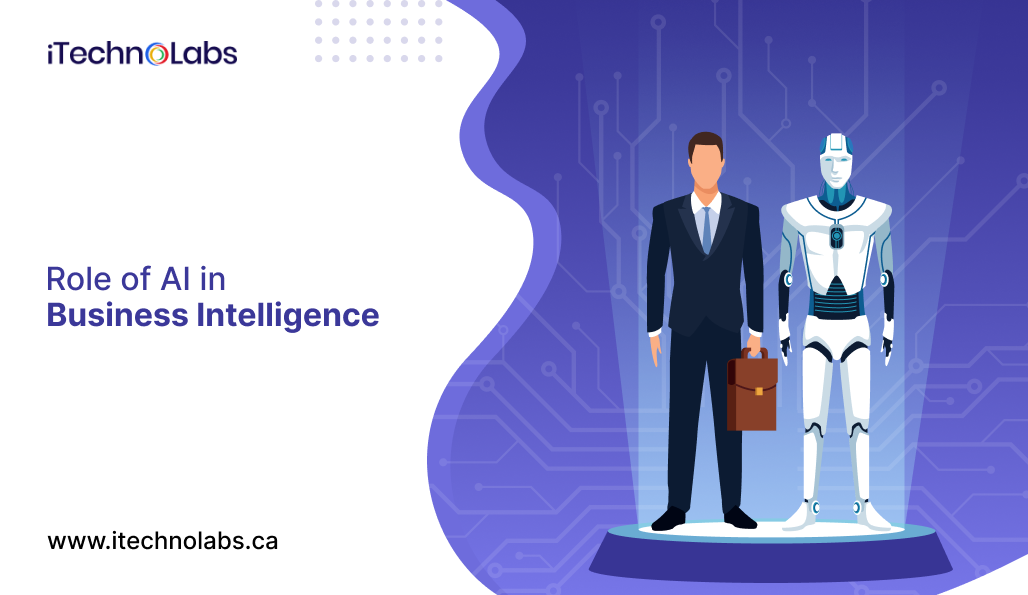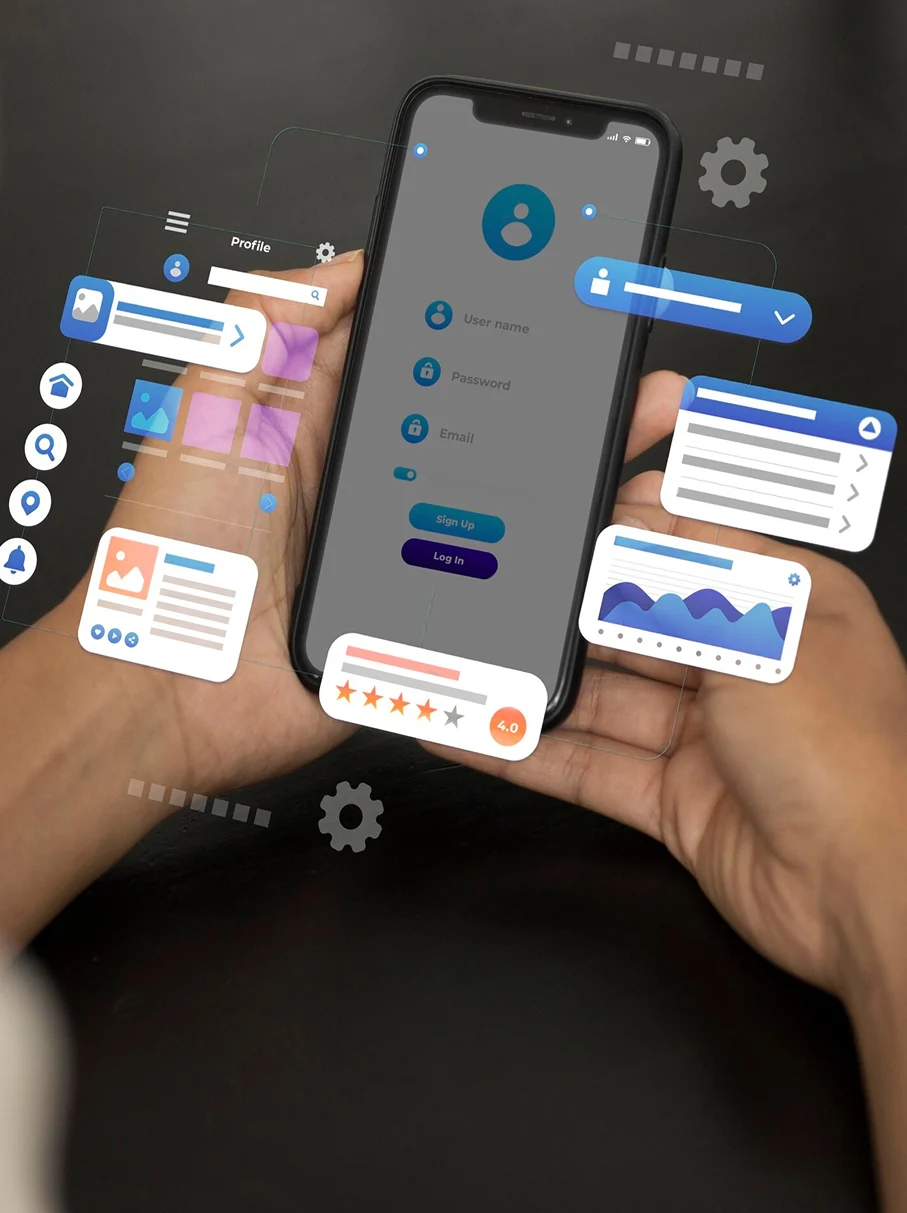According to Solomon Negash and Paul Gray, Business Intelligence is the combination of data collection, data storage, and knowledge management together with analytics to generate high-quality and timely insight for decision-making. Forrester Research defines BI as an umbrella word for functions, processes, and technologies used to convert raw data into action-rich insights in support of strategic and operational decisions. These features, processes, and technologies include data integration, data quality, and data warehousing. The BI market also emphasizes practices such as reporting, analysis, and dashboards, which transform raw data into meaningful insights for decision-making.
AI in business intelligence is to help organizations to move from reactive reporting to proactive, predictive insights. AI automates complex analysis of the organizational data, builds better predictive models, and provides data for everyone in the organization to utilize. AI helps organisations to find hidden patterns in data, automate report creation, and allow users to interact with information using natural language. It also enables forecasting and trend analysis. The ultimate goal is to improve decision-making, boost efficiency, and strengthen a company’s competitive position.
The Importance of AI in Business Intelligence
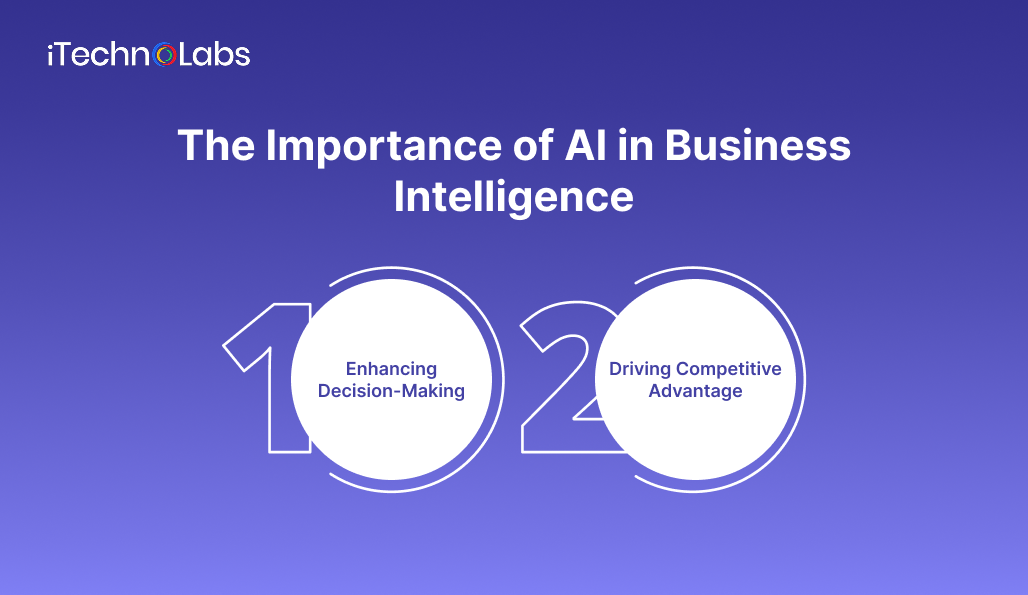
Artificial Intelligence (AI) is transforming how organizations use data to support strategic development and growth. Organizations using AI in Business Intelligence give more than just reporting, AI supports future insights, automation and real -time analysis. Decision-makers will have access to timely, intelligent, and accurate information, enabling businesses to succeed in highly competitive markets.
Enhancing Decision-Making
AI in Business Intelligence helps companies to unlock the deep insight from their data and go beyond traditional reporting. With advanced equipment such as machine learning, natural language processing and predictable modelling, business information can be quickly and more accurately analysed. Instead of relying only on past data, organizations can identify patterns, predict future trends, and make data-driven decisions that support real growth and development.
Driving Competitive Advantage
In a market with high levels of competition, every organization wants every advantage it can get. Companies that use AI in Business Intelligence gain that advantage. Organizations can automate complex analysis to better optimize their existing operations and personalize their customers experiences through automated decision making processes. With AI, raw data becomes strategic foresight to organizations which allows them to keep their competitors behind and react proactively to changes in the market and sustainable growth.
Key Applications of AI in Business Intelligence
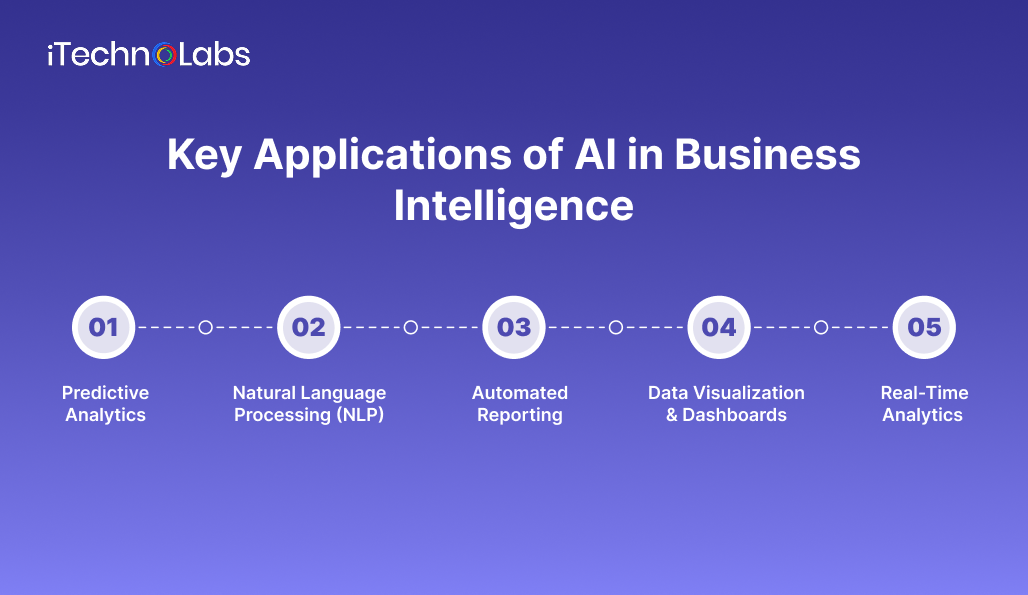
AI in Business Intelligence explains how businesses are collected, analyzed and stated on data. By taking advantage of advanced techniques such as Future Analytics, NLPS and real -time reporting organizations can gain fast, smart and more reliable insight.
Below are the most important applications of AI in business intelligence:
1. Predictive Analytics
The business helps AI-based predictive analysis organizations in intelligence to predict customer market trends and potentially adjacent risks. By analysing historical data companies can identify the opportunities for the future and allocate resources effeciently to reduce uncertainty. This prominent approach allows decision makers to estimate behaviour and trends leading to better decisions and more strategic alternatives for continuous long-term success.
2. Natural Language Processing (NLP)
Natural language Processing in Business Intelligence allows users to query data in everyday language and eliminate the need for technical expertise. Instead of just relying on analysts, employees in the departments can use immediate insight. This data makes access easier, speeds up decisions, and allows non-technical teams to create business opportunities in real time.
3. Automated Reporting
Business intelligence automates the AI reporting process, saves time and reduces human errors. Instead of preparing a manual report, AI produces accurate and and up-to-date insight into seconds. Automated reporting provides adaptable dashboards and scheduled updates to ensure that decision-makers always have the latest information. This efficiency releases resources so that teams can focus more on strategy and innovation rather than data preparation.
4. Data Visualization & Dashboards
Visual representation of data is important for quick understanding. With AI in business intelligence, companies can create interactive dashboards that reveal the most important metrics, trends and real-time KPIs. This AI-operated visualisation simplifies the complex dataset and makes it easier to interpret. Managers can immediately identify opportunities, monitor performance and make better decisions with clear and spontaneous graphic insight.
5. Real-Time Analytics
Business intelligence makes AI-operated with real-time analysis companies to work as well as act on data immediately. This application is especially valuable in industries such as finance, retail and healthcare where immediate insight is important Businesses can detect issues and quickly respond to customer needs while improving strategies and staying competitive.
Benefits of AI in Business Intelligence
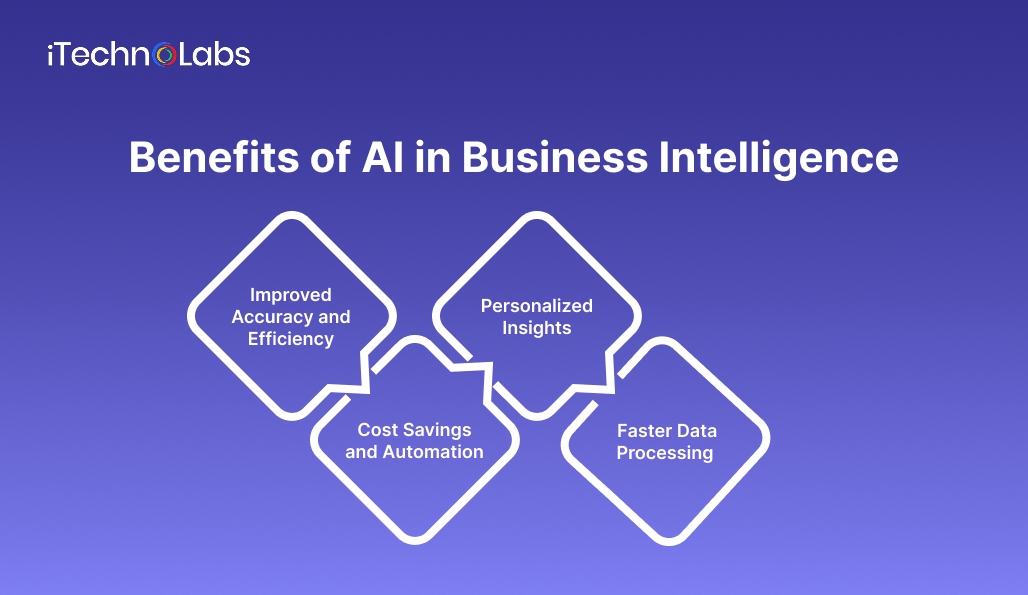
Artificial intelligence again defines how organisations use data for development and efficiency. By adding AI in business intelligence companies can unlock the insight faster than ever. Below are the biggest benefits that show why AI becomes an integral part of modern BI strategies.
1. Improved Accuracy and Efficiency
Accurate data is the backbone of smart business decisions. AI in business intelligence improves accuracy by reducing human error and automatic data features by automating repetitive data.
The AI-operated models treat large versions of structured and unarmed data, providing reliable insight. This efficiency ensures that the decision producers depend on high-quality information, as they are able to trade with more confidence.
2. Cost Savings and Automation
Reducing costs when improving the results is top priority for each organization. With AI in Business Intelligence, organizations collect data, reports and forecasts tasks to automate traditional spends, time and resources.
Automation cuts down on manual labour, reduces errors and adapts resource allocation. This leads to significant cost savings so that employees can focus on innovation and strategy instead of regular tasks.
3. Personalized Insights
By analysing customer behaviour, market trends and business patterns AI distributes the recommendations that are specific and relevant.
Individual insights allow organisations to design targeted campaigns, improve customer experiences and coordinate strategies with goals. It makes a strong relationship with customers by performing better commercially.
4. Faster Data Processing
Speed is important in today’s competitive markets. Business enables the AI outfit in intelligence to treat large-scale datasets which eliminates long delays related to manual reporting.
The real-time analysis lets companies react quickly to market changes, customer requirements and internal challenges. Quick access to insights not only improves agility but also ensures that companies are a step ahead of competitors.
AI Tools and Technologies in Business Intelligence
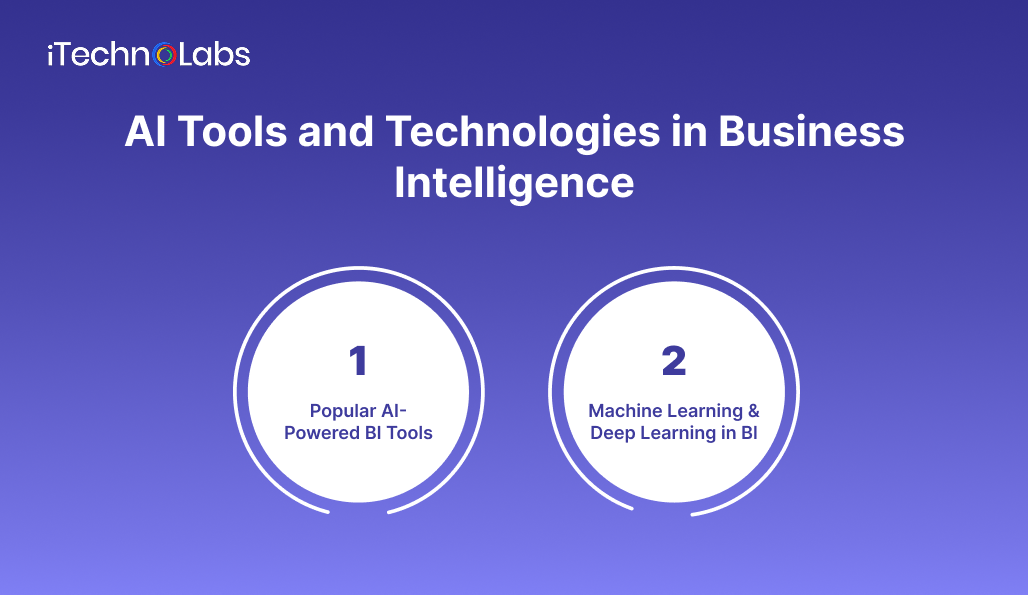
The emergence of AI in Business Intelligence has introduced powerful equipment and technologies that help organisations to convert raw data into action-rich insights. From AI-driven BI platforms to advanced machine learning models, this innovation changes businesses to analyse, imagine and benefit.
Popular AI-Powered BI Tools
Leading BI platforms such as Microsoft Power BI, Tableau and Qlik are integrated into AI opportunities to make platform data analysis smart and more accessible. These devices use AI to automate reporting, create future dashboards and activate natural languages. AI is a mixture of user-friendly interfaces with an insight of data usage which may benefit both technical and non-technical users from commercial intelligence.
Machine Learning & Deep Learning in BI
Machine learning is originally for modern AI in learning and deep learning business intelligence. These technologies analyse historical and real-time data to detect hidden patterns, predict future trends and distribute recommendations. While the machine learning pattern focuses on recognition that enables advanced applications such as image, speech and lesson analysis. Together, they increase decision-making and innovation in BI.
Suggested Article: AI Agent in Customer Service
Use Cases of AI in Business Intelligence
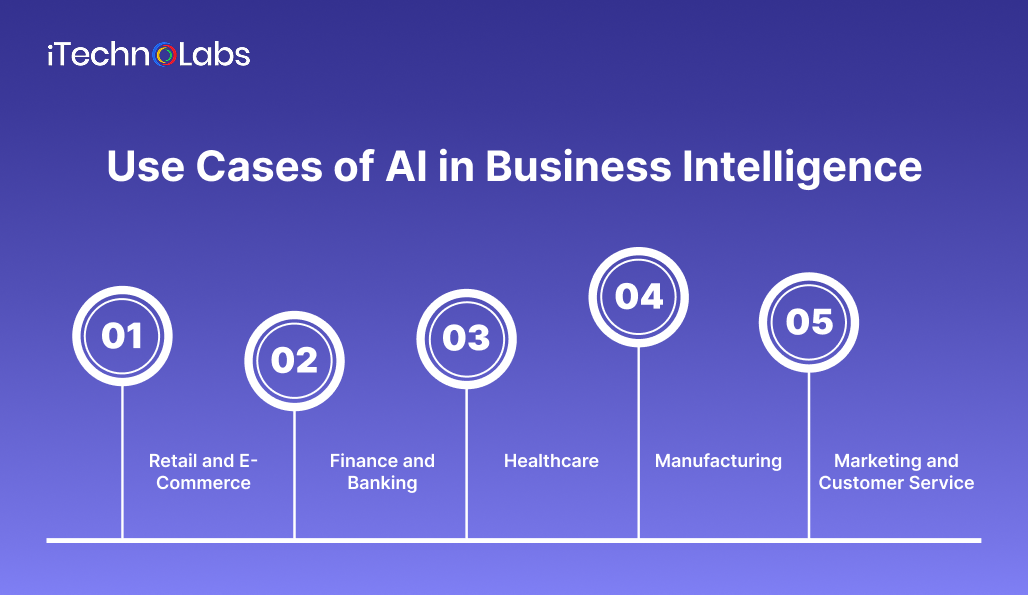
In business intelligence, AI is not just about technology; it’s about solving real business problems in industries. By taking advantage of AI-operated analysis companies can improve operations and increase customer experiences. Here are some of the most effective use cases:
1. Retail and E-Commerce
In retail and e-commerce, AI helps to understand customer behaviour, predict patterns and adapt product recommendations. AI-operated dashboards track sales, inventory and customer preferences to enable retailers and optimize prices, reduce stock and increase the total shopping experience. This leads to an increase in customer loyalty and high revenues.
2. Finance and Banking
For finance and banking, AI provides powerful equipment for detection, risk management and investment forecasting in business intelligence. Machine learning models analyse transaction patterns to flag deviations and reduce the risk of fraud. At the same time, AI-operated BI equipment provides market trends, customer credit behaviour and future insight into financial planning and helps institutions make data intake and safe decisions.
3. Healthcare
In the healthcare system, AI in Business Intelligence supports clinical decision-making, operational efficiency and patient care. AI-operated analysis can predict the outbreak of the disease and adapt treatment plans and streamlined workflows in hospitals. By analysing electronic health records, patient history and medical imaging, BI systems provide action-rich insights that improve the diagnosis, reduce costs and increase patient results.
4. Manufacturing
Manufacturers use AI in commercial intelligence to improve production efficiency, predict the equipment and optimize the supply chain. The future analysis helps identify maintenance needs before a breakdown and reduces downtime and costs. Real-time dashboards track production, resources and logistics to help companies maintain quality, efficiency and competitiveness in global markets.
5. Marketing and Customer Service
AI in business intelligence changes marketing and customer service by offering a personal involvement strategy. AI tools analyse customer data to identify, correspond to brainstorming and recommend offers. In customer service, chatbots and NLP-based systems speed up responses and improve satisfaction, helping build stronger relationships and increase business value.
Future of AI in Business Intelligence
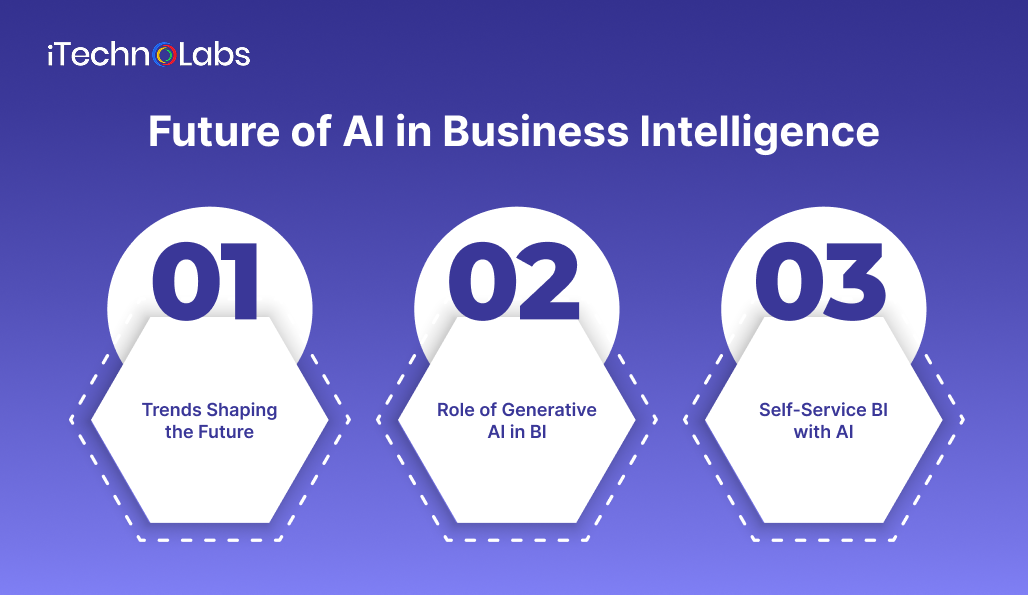
In Business Intelligence, AI future promises smart, sharp and more accessible insights for organizations in industries. As AI technologies advance, BI platforms will become more accessible and predictive, helping businesses make better real-time decisions. Below are the most important trends that shape the future of AI in Business Intelligence:
Trends Shaping the Future
The next wave of AI in Business Intelligence will be run by automation, real-time analysis and enrichment insight. Companies will trust that AI quickly treats the mass dataset, detects deviations and actively recommends tasks. Advanced visualisation, deep integration with IoT units and reference-associative analytics will make BI tools smart, which will help organisations to remain in shape and competitive.
Role of Generative AI in BI
Generative AI is emerging as a game-changer in AI in Business Intelligence. It will enable businesses to generate automated reports, create dynamic dashboards, and even draft strategic recommendations from raw data. By using natural language prompts, users can ask BI systems complex questions and receive narrative insights instantly. This makes BI more conversational, intuitive, and accessible to non-technical users.
Self–Service BI with AI
Self-service BI develops with the integration of AI, so that everyone can use insight without intensive technical knowledge in an organization. With AI in Business Intelligence, employees can interact with data using natural language, can easily adapt the dashboard and get future recommendations. This democratization of BI ensures a rapid decision at all levels and reduces the dependence on special data.
Best Practices for Leveraging AI in Business Intelligence
To get the highest value from AI in Business Intelligence, companies only require more than advanced equipment and require the right strategies. To the best practice, AI provides accurate insights, adopts and creates a commercial effect of the average. It is important practice to take care of below.
Building a Data-Driven Culture
A successful adoption of AI in Business Intelligence begins by promoting a data-driven culture. While making decisions, organisations should encourage employees to rely on data at all levels. This includes training personnel to use the BI tool effectively, promote collaboration across departments and secure leadership championships for AI adoption. A strong culture of computer confidence maximises the effect of BI initiatives.
Ensuring Data Security and Compliance
With the rise of AI in Business Intelligence, protecting sensitive data is critical. Businesses must implement strong security protocols, ensure compliance with regulations like GDPR, and safeguard customer information. Secure data governance frameworks, role-based access, and encryption are essential to maintain trust. Prioritizing security not only prevents risks but also strengthens customer and stakeholder confidence in AI systems.
Continuous Monitoring and Optimization
AI systems need regular oversight to stay effective. By continuously monitoring AI in Business Intelligence processes, organizations can detect anomalies, improve model accuracy, and adapt to changing business needs. Ongoing optimization ensures BI tools remain reliable and relevant, delivering consistent value. Businesses that commit to monitoring and refining their AI strategies stay agile and competitive over time.
Also, read: How Much Does It Cost to Train an AI Model?
Conclusion
AI in Business Intelligence is no longer a futuristic concept, it is a present-day necessity for organizations that want to stay competitive, agile, and customer-focused. From enhancing decision-making and automating processes to predicting future trends and democratizing data access, AI is transforming the way businesses use information.
As companies continue to embrace AI-powered BI tools and best practices, they will unlock smarter insights, stronger strategies, and long-term growth. Businesses that act now and invest in AI in Business Intelligence will not just keep up with the competition, they will set new standards for innovation and success in the data-driven era.
FAQ
1. What is AI in Business Intelligence?
AI in Business Intelligence refers to the use of artificial intelligence technologies, such as machine learning and natural language processing, to analyze data, generate insights, and improve decision-making within BI systems.
2. How does AI improve Business Intelligence?
AI improves Business Intelligence by automating data analysis, detecting hidden patterns, enabling predictive analytics, and providing faster, more accurate insights that drive smarter business decisions.
3. Which industries benefit from AI in Business Intelligence?
Almost every industry benefits, including retail, finance, healthcare, manufacturing, and marketing. AI in Business Intelligence helps companies optimize operations, personalize customer experiences, and stay competitive.
4. Is AI in Business Intelligence suitable for small businesses?
Yes. AI-powered BI tools like Power BI, Tableau, and Qlik offer scalable solutions that small businesses can use to gain insights, reduce costs, and make better decisions without large IT investments.
5. What is the future of AI in Business Intelligence?
The future of AI in Business Intelligence lies in generative AI, real-time analytics, and self-service BI. These advancements will make insights more predictive, personalized, and accessible to all users.

